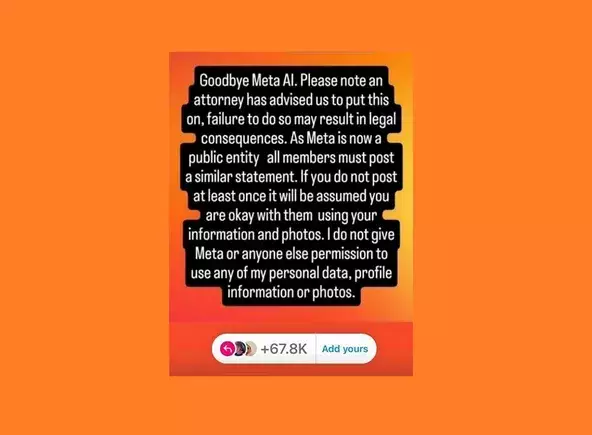In an era dominated by social media influence, the ease of sharing information can lead to widespread misconceptions. This phenomenon is particularly problematic when it comes to legal matters. A recent social media trend encourages users to post messages claiming they do not consent to their content being used for AI training by platforms like Meta. Despite the popularity of these posts, they provide no legal backing or actual effect. Instead of empowering users, these viral messages only contribute to confusion and misinformation. The question is: why do people fall for such tactics, and what can be done to combat it?
To navigate the convoluted landscape of online content usage, it’s imperative to understand the legal agreements we accept when utilizing social media platforms. Each user agrees to the terms of service when signing up for services like Facebook or Instagram. These agreements often permit the platform to utilize public posts for various purposes, including training AI models. Importantly, users can choose to share their posts publicly, which inherently allows the platform to leverage that material.
For example, Meta has stated clearly that “we use publicly available online and licensed information to train AI at Meta.” This understanding is crucial, as many users seem unaware that their own choices about privacy and sharing directly affect how their content might be utilized.
The Role of Public Awareness
Despite the clear statements from Meta regarding its use of public posts, misconceptions persist. The appeal of a simple, powerful message suggesting that one can opt-out of such usage with a mere post is alluring, especially when popular figures, including celebrities, amplify these messages. However, it’s essential to recognize that sharing a vague assertion of non-consent does not equate to an official legal objection.
This phenomenon underscores the urgent need for improved public awareness regarding digital literacy and rights. Many individuals remain oblivious to the terms they agree to, which can lead to disappointment and frustration when their expectations clash with reality.
The social media posts that claim users can protect their content with a simple statement serve as engagement theater — a term that signifies superficial actions that create the illusion of participation without actual substance. The consequence of such actions can be detrimental: they can not only mislead individuals but also increase their vulnerability to scammers. Scammers often target those who exhibit a willingness to believe in unsubstantiated legal protections that are pervasive on social media.
Instead of engaging in these futile exercises, users should direct their energy toward understanding the intricacies of legal rights concerning digital content. Engaging with nuanced content related to copyright, privacy laws, and user agreements will equip users with the knowledge they need to navigate and defend their rights effectively.
Social media is inherently designed for rapid consumption of content, making it an unsuitable medium for serious political or legal discourse. Information shared in bites may often lack context or depth, resulting in misinterpretations that can shift public perception significantly. To mitigate the negative effects of misinformation, users should cultivate a habit of critical thinking when encountering sensational posts.
Instead of solely relying on a single shared post, individuals should seek to engage with reputable sources, thus fostering informed conversations that can lead to meaningful understanding and change. Educational resources abound on the internet — those interested in educating themselves should take advantage of these tools to deepen their comprehension of their rights and responsibilities.
The spread of misinformation on social media highlights the urgent need for digital literacy as a critical skill. As users of these platforms, individuals must recognize the importance of understanding the agreements they enter and the implications of their online behavior. Rather than resorting to sensationalist posts that provide no true protection, it is vital to promote informed participation in discussions about legal rights and digital content. By doing so, users can empower themselves and others to navigate the digital world with greater awareness and confidence. In the end, the responsibility lies with each individual to ensure that they are well-informed, instead of falling prey to the allure of quick-fix solutions that lead to nothing.


Leave a Reply